#Pride and prejudice analysis
Note
Per the notes of your last post, I’d love to hear more of your Thoughts™️ about why Pride & Prejudice works because the two main characters are neurodivergent!! I’ve thought a lot about Darcy being neurodivergent, but not so much Lizzie…
Oh my dear friend you have no idea what you’ve gotten into
So most of the characters in Pride and Prejudice are pretty much stock caricatures, right? Mrs. Bennet is the archetype of the meddling, embarrassing mother, Mr. Wickham embodies the idea of a wicked, seductive rogue, Caroline Bingley is the trope of the bitchy romantic rival. Even Jane (while arguably quite complex) is a classic kind-and-forgiving ingenue, or at least extremely similar to one.
The only exceptions to this rule are Elizabeth and Darcy.
Let’s start out with Elizabeth. You can clearly see she’s a complicated character right out the gate. She’s witty and intelligent but not very wise about people, she’s extroverted and kind to her sisters but can also be rude to people who don’t necessarily deserve it, she doesn’t take many things seriously other than her own opinions. She idolizes her father and ignores his many, many flaws because they’re also HER flaws- they share a bemused high-and-mightiness about their intelligence.
Elizabeth is the protagonist, so readers might expect her to be more complex than side characters. But there’s also something so isolating about being the only fully-fleshed person in a house or a ballroom full of stereotypes and caricatures. So sometimes Elizabeth lets her true colors show, but other times, she plays the game to be able to do the same things her sisters do easily (although she can’t help letting her personality shine through, like at Rosings).
In contrast, there’s Darcy, who doesn’t appear particularly complex at the beginning of the novel. At the ball, he’s proud and unsociable, and he appears not to think much of Elizabeth: “she is tolerable, but not handsome enough to tempt me.” He’s a stereotype here, like all the other characters- specifically, the stereotype of the proud and haughty rich man with little regard for others.
But over the course of the book, Darcy changes dramatically, and so does Elizabeth’s (and the reader’s) perception of him. He’s still proud and he’s still rich, but those aren’t his only qualities. He’s a generous master and a loving brother, he’s an introvert who freezes in public but flourishes around those he cares about, he’s a devoted friend who doesn’t ask repayment for the most extravagant favors.
And, crucially, they share these complexities with each other. Darcy is at his haughtiest and his humblest when he’s with Elizabeth, and Elizabeth laughs and rages at Darcy in turn. They share with each other their flaws at the end, and they realize they’ve found kindred spirits in each other. It’s worth noting that, apart from in her own thoughts, the only person who refers to Elizabeth by her full name is Darcy. Their minds work in very different ways, but they’re both even more different from those around them.
Elizabeth and Darcy are drawn to each other in a way that only two “different” people can be. In a world where their defining qualities are ignored and ridiculed, they each celebrate and love what makes the other who they are. That’s neurodivergent love in its most beautiful form.
I was also gonna talk about Wickham and Georgiana, but this is long already so I might make that a separate post! @dearausten and @koheletgirl I think you might also like this :)
#soph’s askbox#pride and prejudice#Maya tag#Sorry this is late I’ve been incredibly busy#But today was my last day of school not counting exams#So I’m just chilling#Pride and prejudice analysis#Elizabeth x darcy#Also this post is for Shira btw#In conclusion Elizabeth and Darcy are nd4nd and I love them goodnight <3
36 notes
·
View notes
Text
Back thinking some Pride and Prejudice (novel) thoughts again. This time: how bad both Mrs. Hurst and Miss Bingley were/are in the marriage market, for themselves and their brother.
1. Let’s start with Mrs. Hurst. She had a large dowry and excellent education, as she and her sister Miss Bingley bragged about. However, despite these she herself didn’t make some stunning marriage. Her husband, Mr. Hurst, seems to be gentry since he does not work. That is a small step up. But he isn’t titled, doesn’t have a grand estate, and lacks esteemed connections which we readers know because if he did, Mrs. Hurst or Miss Bingley definitely would have bragged about them. Mrs. Hurst supposedly had so much going for her in the marriage market but all she managed was a marriage to a gentlemen with no great estate or connections and is so boring she is still hanging around with her unmarried siblings all the time instead of at her own establishment.
2. Miss Bingley, as mentioned before, had an excellent education and has a large dowry. However, she seems to be on the same or worse path of marriage success as her sister despite these assets in the marriage market. She is able to be in London and socialize widely(implying she’s been out for a few seasons, though we do not know her exact age). But, instead of finding a match during the seasons, she is hanging onto Mr. Darcy though the man has given her NO sign of returning her feelings. This is especially foolish given how we see in the novel that in most cases, if the gentleman is interested it does not take too long till the marriage proposal. Mr. Darcy has had ample opportunity to propose to Miss Bingley if she wished and she’s wasting her youth (I say this only for the time period, in modern day get married at whatever adult age you want lol) wishing for a marriage that won’t happen. Even at the end of the novel she is still unmarried.
3. This leads me to Mr. Bingley. The sisters want their brother to marry someone who will elevate their family’s status. They scorn Jane for her family’s vulgarity and connections to the trade. Miss Bingley’s letter to Jane indicates she hopes for a union between Mr. Bingley and Georgiana Darcy. Again, both sisters are showing how bad they are at the marriage market they have supposedly trained for and understanding their brother. While Georgiana Darcy would bring a lot to the Bingley family, it would not be as fabulous a match in terms of status for the Darcys. Furthermore, Georgiana is not even out yet and it may be another year or more till she is. The Bingley sisters know their brother falls in love a lot. It seems poor strategy to hope that he will not have fallen for anyone by the time Georgiana is out. The better strategy would be if they promoted some friend of theirs who is already out and they deemed a suitable match to marry quickly before their brother falls for the “wrong” person (as he ended up doing in their eyes).
In essence: even though the Bingley sisters were educated for their entire lives on how to be marriageable and had excellent dowries, they failed/are failing at making the best matches and not helpful to their brother in making the advantageous match that they desire.
#pride and prejudice#Strong feelings on pride and prejudice#dancing chopines thoughts#pride and prejudice analysis
15 notes
·
View notes
Text
Pride and Prejudice Summary Is an 1813 novel of manners by Jane Austen, The novel follows the character development of Elizabeth Bennet, the dynamic protagonist of the book who learns about the repercussions of hasty judgments and comes to appreciate the difference between superficial goodness and actual goodness.
#pride and prejudice summary#pride and prejudice book summary#pride and prejudice plot#pride and prejudice analysis#pride and prejudice synopsis#pride and prejudice chapter summaries#pride and prejudice short summary#pride and prejudice plot summary
0 notes
Text
Both Pride & Prejudice and Much Ado About Nothing work so well as enemies to lovers because despite surface animosity, it's clear that both end couples really respect each other and for good reasons. I think you could even argue that with Beatrice, she spars with Benedick because she considers him a worthy opponent.
When Hero and Ursuala plot to make Beatrice fall in love, Hero instructs her to speak of Benedick and "praise him more than ever man did merit" and yet when Beatrice finally speaks, she doesn't disagree with their high praise, she says of Benedick:
For others say thou dost deserve, and I
Believe it better than reportingly.
Benedick likewise after his eavesdropping on Don Pedro, Leonato, and Claudio's praise Beatrice says:
They say the lady is fair; 'tis a
truth, I can bear them witness; and virtuous; 'tis
so, I cannot reprove it; and wise, but for loving
me; by my troth, it is no addition to her wit, nor
no great argument of her folly, for I will be
horribly in love with her.
Similarly in Pride & Prejudice, once the misunderstanding about Wickham is cleared away, Elizabeth is able to acknowledge to herself how much she respects and likes Darcy:
She began now to comprehend that he was exactly the man who, in disposition and talents, would most suit her. His understanding and temper, though unlike her own, would have answered all her wishes. It was an union that must have been to the advantage of both: by her ease and liveliness, his mind might have been softened, his manners improved; and from his judgment, information, and knowledge of the world, she must have received benefit of greater importance.
Darcy also finds that he admires Elizabeth, after initially dismissing her:
But no sooner had he made it clear to himself and his friends that she had hardly a good feature in her face, than he began to find it was rendered uncommonly intelligent by the beautiful expression of her dark eyes. To this discovery succeeded some others equally mortifying. Though he had detected with a critical eye more than one failure of perfect symmetry in her form, he was forced to acknowledge her figure to be light and pleasing; and in spite of his asserting that her manners were not those of the fashionable world, he was caught by their easy playfulness.
All of these characters also hear and accept criticism of themselves. Both Benedick and Beatrice hear they are too proud to accept love, which they both overcome. Elizabeth learns that she judged Darcy without sufficient information and Darcy that his behaviour was not that of a gentleman. Their mutual acceptance of this criticism and their growth as people leads to their ultimate happiness.
Unfortunately, those who reproduce this trope often forget to build this foundation of respect and the acknowledgement, either personally or publically, that the characters have been wrong. Instead we get characters who mid argument begin ripping each other's clothes off. No growth, no understanding how they have been wrong, it just becomes "thin line between hatred and love" instead of "we grew towards each other".
#enemies to lovers done right#enemies to lovers trope#trope analysis#pride and prejudice#much ado about nothing#much ado about nothing day#growing towards each other#obviously the character growth is almost instant in Much Ado#but that's just a time factor#a lot more room in a novel#shakespeare#benedick#beatrice#elizabeth bennet#mr. darcy#fitzwilliam darcy
852 notes
·
View notes
Text
Deconstructing Mr Darcy
My favourite character in all Austen canon is Mr Darcy. Unfortunately, as soon as I say this, everybody is like

Because when I say this people think of this…

And this…

But that’s not why he’s my favourite character.
There is this famous quote by P.D. James in which she argues that Austen's Emma is like a predecessor of the detective novel, in the way that she sprinkles clues as to what's really going on with Frank Churchill.
And ever since, I've been reading Pride and Prejudice differently, because of course she does something similar there too.
Specifically, Austen constructs this elaborate character puzzle with Mr Darcy at its centre. Every time he and Elizabeth clash, throughout the novel, one of the central conflicts sparks up: what is Darcy really like?
Elizabeth’s early interest in him is often interpreted as sexual tension/latent attraction. I’m not saying this isn’t the case (you can argue about this). But what is evident is that her intellectual interest in characters is roused by him. Because, well, he really presents her with a tricky puzzle.
1) The mysterious man at the ball
When Elizabeth and her sisters go to the Assembly Ball at Meryton, remember, they go there to ogle Mr Bingley. He is the rich, handsome bachelor they hope to dance with when they get there.
But then they actually arrive and it’s someone else who has everyone talking. Mr Darcy. He’s the tall, handsome stranger who turns out to be much, much richer than Mr Bingley, and who gets everyone excited.
Who will he dance with?
Well, nobody because he’s like way too important to deign to notice any of them. He stoops to acknowledge that Jane, literally the most beautiful girl in the county, is somewhat pretty. But her sister is totally beneath his notice.
With this twist upon a twist, the author invites Elizabeth and the reader to abandon their first suspicion that he’s the hero and to consider him a little absurd instead. And this is a comic novel. By that point we have met multiple absurd characters, so we know this is what is to be expected from this story.
2) The cracks
The narrator hints that Darcy enjoys a good gossip with his friends and spends his free time dissecting the many ways in which the local women don’t interest him. Again, absurd, remember? Elizabeth is among the women he judges harshly, but as he sees more and more of her this happens:

So the reader is now invited to some irony which Elizabeth is not privileged to enjoy. But it’s all in service of the comedy, right? Because it’s more delicious for the reader to see the contrast of how much Elizabeth is wrong about what he thinks of her.
You, the reader, have a good chuckle with the author about this, don’t you? But while you’re laughing you’re MISSING A CLUE! And it’s right there: Elizabeth is wrong about Darcy. It’s lampshading the fact that she doesn’t really understand him at all.
3) The real deal
So then we get a little closer to Darcy. Elizabeth stays with him and his friends at Netherfield to nurse her sister. As Darcy continues to admire her, and as she continues to be oblivious, one evening he approaches her and this happens:
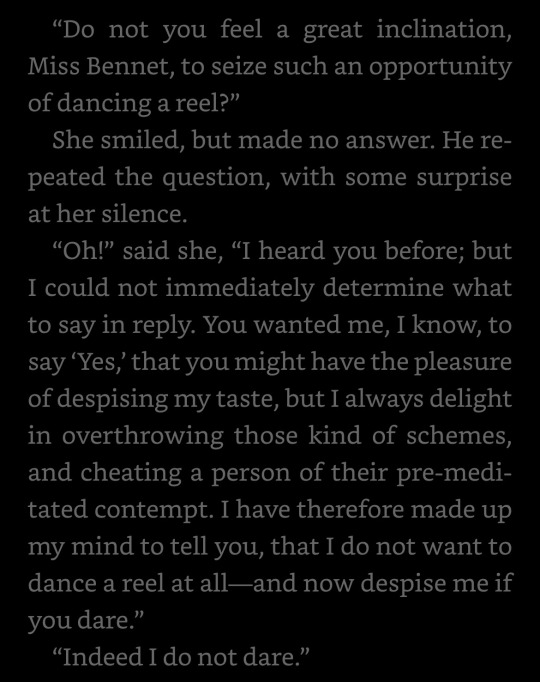
Again Elizabeth is wrong about Darcy, but here Austen adds another clue:

So… the guy who has the superpower of turning any normal situation awkward makes this super awkward situation… charming?
And then Austen adds some misdirection by immediately adding:
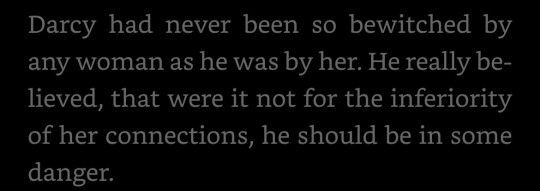
And we’re focusing on the irony that this guy is more enchanted with her the more she rejects him. And we’re a little amazed at how arrogant this guy is that he doesn’t see how much he is disliked at this moment. Almost as self-important and oblivious as Mr Collins.
And so we don’t see that… he’s nice? And I mean, an arrogant, self-important arse, as Elizabeth thinks of him, wouldn’t be nice at this point. He’d be wounded. He’d make it awkward. Importantly, he’d make it awkward for her.
It’s hard to get out of a situation like this gracefully. But he can. He knows how. He has that ability.
And this works as a bit of foreshadowing too, of course. Dancing and courtship are pretty strongly linked in Austen (and culturally in that era) and so his acceptance of her rejection in this manner lampshades his character as a lover.
But there’s so much more. That time at Netherfield is so rich in character studies, I feel like someone could write several PhD theses on that section of the book alone.
My favourite is the one that happens when Darcy and Elizabeth literally talk about characters. Miss Bingley asserts that Darcy is perfect, has no flaws. Elizabeth is delighted: this is just what she thinks Darcy thinks of himself.
Darcy says: No, I’m plenty flawed, thanks.
Elizabeth is curious now. Go on, oh prideful one, enlighten us mere mortals!
Darcy explains that he’s resentful, that he doesn’t forget or forgive easily.
Elizabeth has to admit that that’s a non-ridiculous answer. She’s disappointed, a little, because what good is that to her, since she wanted to have a good laugh at this expense? But he predicted as much and at the beginning of this conversation challenged her on this to preempt her making a joke of the whole conversation.
He wants to continue to be serious and this happens:
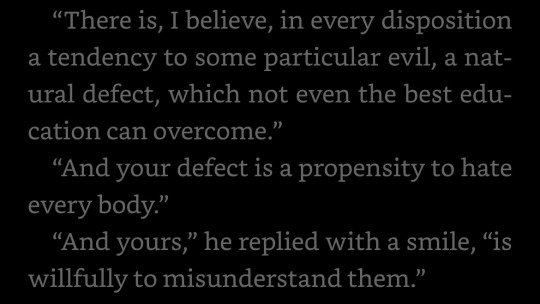
Again, Austen’s sleight of hand: when we first read this, it sounds more like Darcy is just a misanthrope who has a negative and pessimistic attitude towards people. That’s how Elizabeth hears it too.
But he tells us himself: that’s not what he means. Elizabeth (and the reader) is misunderstanding him. And he shows us, right away, by taking her jibe in good humour right then and there.
Multiple times, Elizabeth teases or attacks him, and he’s cheerful about it. He thinks it’s kind of funny. Bingley gets a shot or two in, and Darcy takes that on the chest too.
Austen manages to create this impression of him in the reader’s mind of a guy who is angry and prideful all the time, but when we review his actions, how often is this really true?
4) Darcy through the eyes of others
In many analyses, Elizabeth is blamed for being so easily taken in and so stubbornly mistaken in Darcy, but in all fairness, look at what she has to work with!
So much of what she learns about him is through other people, and so what she knows is filtered by their interests, skewed perspectives and compromised judgements. The fawning of Caroline Bingley and Mr Collins, the hatred of George Wickham, the deference of Mr Bingley, the lack of deference from Colonel Fitzwilliam, the way Charlotte views men, the way Jane always finds good things to say about anybody, her mother’s vulgar prejudice, all of it adds to a picture of absolute confusion. And the worst offender is Darcy himself, of course, because he stubbornly refuses to clarify anything about himself, partly because he can’t and partly because he just won’t.
Darcy’s stay in Hertfordshire culminates in this exchange, at the Netherfield Ball, between Darcy and Elizabeth:
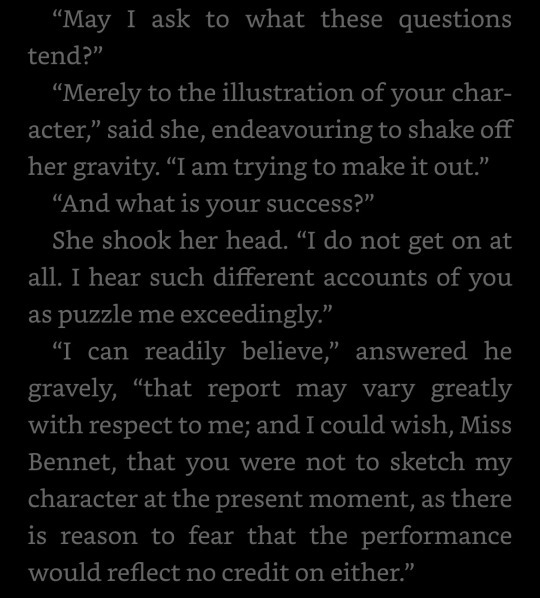
5) Mr Darcy in love
Darcy really is a hard nut to crack, and in large part it’s because he makes himself hard to crack. The baseline here is pretty bad but it gets so much worse the more he loves Elizabeth and the more he is determined to hide from her.
Before, he just doesn’t care what people think of him. But now, he does care and he desperately wants them not to know that he has, annoyingly and embarrassingly, fallen head over heels in love.
Austen strings us along in this confusion until the absolute shock that comes with his proposal. Even though we as readers always knew more than Elizabeth did, and even though both we the readers and Elizabeth had tonnes of evidence and clues about Darcy and his real character, this twist comes as a complete surprise.
And because we, the readers, and Elizabeth, the protagonist, are surprised, we don’t notice another important clue. Darcy is also shocked. Like, we’re all sitting in this scene, aghast, amazed, shocked. We all came to this point following a trail of wrong clues, misdirections, misunderstandings and mistaken assumptions.
But what does this tell us about Darcy? Other than what he finally reveals through his letter, we learn that the entire time he thought Elizabeth:
Knew what she was doing, flirting with and encouraging him
Understood his prevarication
Expected a proposal
The poor man doesn’t come out of this looking good, does he? It makes him look really arrogant, self-important and big-headed. And to an extent, well, it is.
But there’s also another, kinder, reading to all this: that he’s someone who overthinks things.
There’s the conversation in Netherfield with Bingley where he deprecates those who do things rapidly as if it were a virtue. We know from other parts of the novel that he’s a bookish (he prides himself in his library), intellectual (he admires those who read), “clever” (in the narrator’s own words) guy.
Used to responsibility, used to being relied on to guide and advise people, used to solving knotty problems, Darcy approached his problem (loving a girl who is in every way beneath him) in the same way. He deserves a large portion of the smackdown he receives—no argument from me here. It does him good, later, as we all know. But when we revisit the novel, these deeper dimensions of his character become more apparent whenever we come to this moment: that Darcy’s flaws are not just the obvious ones here (pride, arrogance, lack of manners) but also shades of other traits of his.
6) A mystery to the very end
At this point, Austen begins to clear the mist a little. Darcy gets such a blow with Elizabeth’s rejection that our heart does go out to him, and then the letter explains so much, you begin to feel like he’s been wronged with our harsh view of him. We’re brought into his home, and so, slowly, we are shown that, yes, he’s sort of quiet and taciturn, and maybe his people skills aren’t exactly up there, but he’s actually quite nice, at least willing to try to be outwardly more friendly, but in essence he’s a kind person and a responsible landowner. Elizabeth begins to see that he’s rather attractive.
The reader and Elizabeth begin to thaw towards him. And then Lydia runs away, All seems lost. Wickham has been such a wicked force in Darcy’s life, Elizabeth has already tried Darcy to the edge of what any reasonable man would put up with and Elizabeth’s family exposes herself in the worst possible way.
What I love is that Darcy’s true character is always, always most visible through his actions. This mirrors the whole point of the novel of course: that we should pay attention not to impressions, superficialities (words) but to what people really are, and what they actually do (actions). So, Darcy doesn’t say anything, in fact he swears everybody to silence. He just does. He saves Elizabeth’s family in the most warm-hearted, generous and forgiving way possible.
Anyway, I could write books on this subject just because of how much there is to say, and this is but the tip of the iceberg, but I’ll leave off here. I just wanted to explain why I love Mr Darcy, the character, and why you should too. Not as a literary romantic hero, not as a literary crush but as a really interesting, beautifully written, complex character in his own right.
83 notes
·
View notes
Text
Five days into good omens season 2 and we are madly conspiracy theorizing like mad conspiracy theorists:

#neil gaiman#hope you're pleased#this isn't fun anymore give us a clue man#whats going on#im going absolutely mad over here and guess who's fault is that#coffee theory#the metatron#closing credits#the opening credits#pride and prejudice#the crow road#seventh episode#god likes sevens#i know where i'm going#the hitchhiker#the book of life#good omens analysis#good omens meta#good omens 3 speculation#good omens#good omens 2#good omens season 2#gos2#good omens spoilers#gomens#gomens 2#good omemes#good omens meme#good omens memes#go memes
161 notes
·
View notes
Text
Darcy is not a grump
Darcy gets a bad rap as being glum and cranky, and while he does certainly have those moments, and he has a serious personality overall, he actually smiles a lot in the book, and all but one of those times are before his "transformation" from a dick to a nice guy!
So who is actually the most glum Austen hero? I searched the online texts of each of the six novels to find out, then made this chart:

Things I found interesting in my research:
Darcy is actually more cheerful than most Austen heroes!
Darcy is described as expressing cheer twice as much as Bingley. In fact, Bingley is described as explicitly smiling zero times!
Knightley, who I always think of as being pretty serious, is actually the second most cheerful guy out of the whole lot
Edmund, who deserves to be sad because he sucks, is far and away the happiest hero, damn it
Only Bingley, Henry, Knightley, and Edmund laugh
Now obviously, the length of each book and the amount of time each character appears greatly affects this. For instance, Bingley gets far less page-time than Darcy, so it makes sense that we hear about his emotions far less—of course I am not suggesting that Bingley's temperament is actually more serious than Darcy's. I'm also certain that Henry Tilney would have won out over Edmund as the most cheerful hero if Northanger Abbey was as long as Mansfield Park is; NA is only about 77k words, while MP is twice as long at 159k words. Plus, MP spends a lot more time in the man's POV than most of the novels do. If I was a statistician, I would find a way to adjust for these factors, but even I am not that nerdy.
My full notes are under the cut, if you're a complete Janeite nerd like me and want to dig into my non-scientific data.
Edward: 1 smile, 1 description of surroundings that "exceedingly pleased him", 1 "heard with pleasure", 2 cheerful; total 5
Bingley: 0 smiles!!!, 1 "expression of half-laughing alarm," 1 laugh, 1 pleased, 1 "expressed great pleasure" but might be polite figure of speech, 1 "looking both pleased and embarrassed," 1 "ease and cheerfulness", 1 "was all grateful pleasure" but not sure if accurate/sincere; total 6
Wentworth: 2 smiles, 1 "little smile," 1 "half smiling," 1 "almost a smile," 1 "artificial" smile, 1 "smiles reined in" which I think applies to both W and Anne, 1 assumed laughing as part of a group, 1 joined a walk with pleasure; total 7
Brandon: 1 "faint smile," 1 "tried to smile", part of 1 "every body laugh", 1 pleased, 1 received civilities with pleasure, 1 pleasure "will be very great", 1 "his open pleasure in meeting her", 1 "engaged with pleasure", 2 cheerful; total 8
Darcy: 8 smiles, 1 "a sort of smile," 1 "smile of affected incredulity" when E's talking about Wickham during the proposal, 1 "expression of heartfelt delight", 1 "delighted with their engagement", 1 meditating with pleasure on fine eyes, 1 thinking cheerfully; total 13
Henry: 8 smiles, 1 "endeavouring not to smile," 1 "set smile" but he's trying to be funny, part of 1 "everybody smiled", 1 laugh, 1 "you are laughing" said by C directed at H but the narrator doesn't say he's laughing or smiling but he certainly is teasing, part of 1 group laugh, 2 times being amused, 2 delighted with C, 1 "pleasure of finding nothing to detain me" but unsure if polite figure of speech: total 19
Knightley: 14 smiles, 1 "reproachful smile," 1 "trying not to smile and succeeded without difficulty," 1 "she forced him to smile," 1 "trying not to smile," 1 laugh, 2 pleased, 1 amused, 1 feeling of "delightful assurance", 1 pleasure, 1 "pleasure always" re: being with Jane, 1 "chat of pleasure", 1 cheerful: total 23
Edmund: 10 smiles, 1 "you may smile" said by Mary directed at E, 1 "serious smile," 1 smile by "the three others" but I can't tell if E is one of those three, 1 "smile that did not sit easy," 1 smile that seems to be from E but might be from F, part of 1 group laugh but F thinks E is struggling to be cheerful but is successful, part of 1 group laugh off-page, 1 laugh, 1 pleased, 1 amused, 2 delighted, 1 "delightful happiness", 4 pleasure, part of 2 group pleasure, part of 3 cheerful groups, 3 cheerful: total 32
I counted every mention of a smile, laugh, or looking amused or pleased, or having delight or pleasure, or being cheerful. If there was a mention of everybody or a group smiling or laughing, and the guy was part of the group, I counted it. "Faint smiles" and the like are counted, as are instances where the guy is trying to not smile, but I did not count any time the narrator said the guy tried to smile, forced a smile, laughed bitterly, etc.—only genuine cheer, however small, counts! I also did not count any instance of the guy expressing "his pleasure" when it was clear it was just a polite figure of speech.
Searched for: smile/ing, laugh, amuse, pleased, pleasure, delight, cheerful, happy countenance, happy face, happy look, happy expression, look of happiness, expression of happiness
Did not search: gay, gaiety, joy, felicity, merry, merriment, or happy/happiness without modifiers, because this already took way too many hours (yes, hours) as it was!
#we deserve a smiling darcy#jane austen characters#jane austen men#jane austen#mr darcy#pride and prejudice#mr bingley#mr knightley#emma#edward ferrars#colonel brandon#sense and sensibility#captain wentworth#persuasion#mr tilney#northanger abbey#edmund bertram#mansfield park#literary analysis#chart#my stuff
539 notes
·
View notes
Text
I have a few questions for Jane Austen fans about one important scene in Pride and Prejudice.
I still remember the post that circulated some time ago about the fact that when Darcy makes his first proposal, he finds Elizabeth alone because she's stayed behind with a headache while the others have gone to Rosings for tea. A stress headache caused by her overwhelming rage at the reveal that it was Darcy who persuaded Bingley not to marry Jane. Which gives her even more reason for responding to his insulting proposal by verbally ripping him to shreds.
I was surprised by how many people responded to that post by saying that they always thought Elizabeth just pretended to have a headache to avoid seeing Darcy at Rosings.
The text doesn't seem ambiguous to me: the omniscient narrator states that Elizabeth had a headache caused by her stress, which combined with her reluctance to see Darcy to make her stay behind:
The agitation and tears which the subject occasioned brought on a headache; and it grew so much worse towards the evening that, added to her unwillingness to see Mr. Darcy, it determined her not to attend her cousins to Rosings, where they were engaged to drink tea
But some people would argue that Austen is just being playful. She often makes sarcastic statements that blatantly aren't true, so maybe the above is just her playful way of stating that Elizabeth faked a headache to avoid seeing Darcy. It doesn't come across that way to me, but then I'm on the autism spectrum and don't always understand subtext either in real life or in fiction.
I already wrote a post asking people how they interpret this passage, but I thought I'd ask it again. Real headache or fake headache?
Then, of course, Darcy arrives. I've been wondering: how do other readers interpret his choice to visit and propose to Elizabeth then and there? Here's the text:
In a hurried manner he immediately began an inquiry after her health, imputing his visit to a wish of hearing that she were better. She answered him with cold civility. He sat down for a few moments, and then getting up walked about the room. Elizabeth was surprised, but said not a word. After a silence of several minutes, he came towards her in an agitated manner, and thus began:—
“In vain have I struggled. It will not do. My feelings will not be repressed. You must allow me to tell you how ardently I admire and love you.”
In the small amount of commentary I've read so far, I've come across three interpretations of Darcy's actions at this point.
(a) The most generous: He visits out of genuine concern for Elizabeth, and upon seeing that she's feeling better, he decides that now is as good a time as any to propose.
(b) Slightly less generous: When he hears that she's alone with a headache, he decides to seize the opportunity to go and propose, using "inquiry after her health" as an excuse.
(c) The least generous: When he hears that she's alone with a headache, since he thinks she knows his interest in her and has been encouraging him, he assumes she must be faking the headache to give him the chance to find her alone and propose.
Unless I'm forgetting some line or other, the last suggestion seems a little bit far-fetched to me – not that he thinks she's been encouraging him, that of course is true, but that he should think she's faking the headache just to make him visit her.
But I could believe either the first or the second interpretation. Does anyone else have any views on the subject?
@anghraine, @bethanydelleman
#pride and prejudice#jane austen#elizabeth bennet#fitzwilliam darcy#analysis#character interepretation
162 notes
·
View notes
Text
I NEED THIS. WHAT HAPPENED TO THIS SCENE. WHERE DID IT GO.

#u guys dont understand how badly i need literary analysis from henry#my whole thing is literary analysis!!!!!! thats my thing!!!!!!!!#i need to hear more of him talking abt the things he likes or im gonna explode#if i dont get to hear him talking abt the picture of dorian gray or pride and prejudice or something idk what kinda man ill become#like. please.#this also looks like that scene where alex is running and texting henry abt his tie and henry goes 'grey is a color thank u' which is so!!!#im losing it. i need his thoughts on literature NOW!!!!#or im gonna start making them up myself and im gonna be real im completely fine with that#rwrb#red white and royal blue#henry fox#henry george edward james hanover stuart fox#alex claremont diaz
64 notes
·
View notes
Text
During the confrontation, Lady Catherine accuses Elizabeth of being ‘lost to every feeling of propriety and delicacy’, a charge that she equates with her refusal to accept the distinctions of social class. But, as Elizabeth demonstrates, true propriety and delicacy are indicative of manners rather than rank. Furthermore, although Elizabeth refuses to be bullied by authority and exhibits courage and frankness in her private encounter with Lady Catherine, she also has a heightened awareness of the importance of observing social forms in public. […]
It is striking that no such decorum is necessary for the union between Elizabeth and Darcy. Indeed, their relationship is defined by their mutual candour, and their unwillingness to dissemble, which is perhaps what Darcy implies in his remark that ‘neither of us performs to strangers’. […] Elizabeth shows her grasp of the particular dynamic of their relationship when she assesses the qualities with which Darcy fell in love:
‘My beauty you had early withstood, and as for my manners - my behaviour to you was at least always bordering on the uncivil…. Now be sincere; did you admire me for my impertinence?’ ‘For the liveliness of your mind, I did' ‘You may as well call it impertinence at once. It was very little less. The fact is, that you were sick of civility, of deference, of officious attention. You were disgusted with the women who were always speaking and looking, and thinking for your approbation alone. I roused, and interested you, because I was so unlike them" (PP, p. 380)
It is precisely Elizabeth’s irreverence and frankness that make possible a private language between them that transcends a society dependent upon conformity to social mores.
- Paula Byrne, The Genius of Jane Austen. Her Love of Theatre and Why She Is a Hit in Hollywood
#a private language between them that transcends society#jane austen#pride and prejudice#paula byrne#the genius of jane austen#letteratura#analysis tag#currently reading#elizabeth bennet#fitzwilliam darcy
91 notes
·
View notes
Text

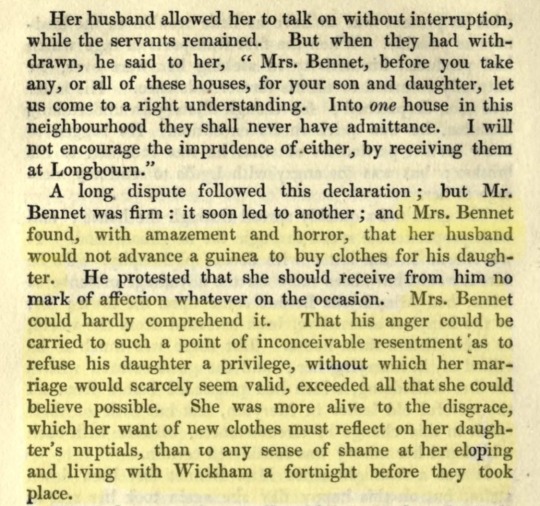
mrs. bennet arguing with her husband and emptily threatening to disown her daughter for not marrying an asshole VS. mrs. bennet being unable to comprehend the “horror” and “inconceivable resentment” of her husband not buying their other daughter fancy things for a marriage to a different asshole. she is the perfectly accurate parody of unhappy mothers everywhere
#im not hating just observing#pride and prejudice#jane austen#book thoughts#book opinions#books#mr. bennet#mrs. bennet#literature#english literature#elizabeth bennet#lydia bennet#character analysis
19 notes
·
View notes
Text
the letter undoes her misunderstandings and prejudices and gives her a true understanding of his character but it’s really more a moment that’s about seeing her own character truly than anything else. the work it does on his behalf is submerged beneath the self-reflection it evinces of her own blindness and flaws. seeing him in person at his gorgeous house re-introduces him in the true Seeing Your Love Interest across a Crowded Room way that’s a shot of heady romance for US but as far as Lizzy’s experience is concerned it’s still not the time for realizations. The changes being created are still going on underground, the new sensible understanding of Darcy being polite, of being generous, of being backlit by such a tasteful display of wealth, of being at home in his own context, is combining with her new understanding of his character to produce all the right emotions for love but she still doesn’t recognize the full extent of what’s happening until she suddenly has to leave and go back to the family chaos and heartbreak caused by Lydia and then she’s just like “oh. oh no. oh NO.”
#pride and prejudice#I know this is so obvious but it’s just so good#romcoms should always trace a believable emotional route into love but most of them structurally fail#which is such an obnoxious thing to say. but.#((((anyway sometimes I reread my own analysis and I’m like ‘you did it! you broke down something beautiful and true to the dry essentials#‘in the most un-fun way’#and I want to bonk myself on the head with a cardboard tube#I love analysis and sometimes I think it’s a villainous thing to do#I’m sorry this is too many thoughts for one post. or at the least the wrong combination)))))
10 notes
·
View notes
Text
the real difference between sns and sasusaku is that naruto is an irreparable bootlicker who wanted to "fix" sasuke while never once stopping to ask himself if he was the one that needed fixing.
but if sakura learned the truth about konoha killing the uchiha, she would 100% be on sasuke's side and purposefully start her anti-konoha character development à la mr. darcy. this would in turn cause sasuke to go through his own elizabeth bennet-esque character development where he realizes he judged sakura too quickly, thus kick-starting his 'sasuke gets hugs and validation and learns the power of self-loving forgiveness and interdependence' arc
i've put way too much thought into this, in case you cant tell
#pride and prejudice#sskposting#anti sns#anti naruto#sasusaku#otp: thank you#pro sakura#pro sasuke#anti konoha#pro uchiha#nrt meta#my meta#character analysis#relationship analysis#genocide depiction
97 notes
·
View notes
Text
If gratitude and esteem are good foundations of affection, Elizabeth's change of sentiment will be neither improbable nor faulty. But if otherwise, if the regard springing from such sources is unreasonable or unnatural, in comparison of what is so often described as arising on a first interview with its object, and even before two words have been exchanged, nothing can be said in her defence...
~ Jane Austen, Pride and Prejudice
Been thinking about this quote recently in relation to episode 22, and Martin falling for Jon. No big meta to add, I just think it's a nice connection.
#the magnus archives#my magnus archives stuff#magnus archives speculation/analysis#martin blackwood#22 colony#the dinghy#pride and prejudice#jane austen#original post
8 notes
·
View notes
Video
youtube
Princess Weekes “The Politics of Loving the Bad Guy” (2023)
#princess weekes#problematic fave#media analysis#fandom#villain#media discourse#social commentary#character analysis#interview with the vampire#pride and prejudice#house of the dragon#once upon a time#the vampire diaries#star wars#gone girl#screenwriting#video essay#2023
11 notes
·
View notes
Note
Asking as a curious follower! Are there any books that you really didn’t enjoy or understand when you first read them and then loved on a second read?
Honestly? Pride and Prejudice. I was overly familiar with it as a concept, due to the 1995 series and then the 2005 Keira version, but as a kid I thought it was about two people whose hatred of each other morphed into love as outside forces forced them to work together. That idea gave me an extremely unhealthy view of romance ("If we start out fighting, that's great, because eventually it means we'll fall in love!"). And when I read it the first time, at 16 or so, I didn't really apply my critical thinking skills to it, because I was contemptuous of romance and social satire and much preferred more blood-and-guts relationships like Rochester and Jane Eyre (which I also did not understand at that point in my life). So. I felt that Pride and Prejudice was a fluffy cupcake version of romance that didn't apply to any reality; in essence, teenage me thought it was like modern bodice rippers and viewed it with no small degree of contempt.
And then I grew up. I got a History degree. I read commentaries on women's rights in the eighteenth and nineteenth centuries. I began to apply context to the story Austen was telling me. I began to understand the difference between healthy romance and toxic romance. I began to shed my internalized misogyny. I punched a few boys in the balls (yes, really). And crucially, I began to understand the language that Austen used to tell her story. And I began to realize how bold and daring Lizzie Bennet actually is not to settle. And then I re-read Pride and Prejudice for a third time and it clicked that this novel is really, truly, absolutely fucking superb.
It is still not my favorite Austen, not by a long shot. It still annoys me that everyone defaults to naming P&P as The Best Austen, when clearly Persuasion is her best work (closely followed by Sense and Sensibility; I am my family's Elinor).
But it all comes down to this, which I told my students when I was a teacher: literature gets better as you grow and learn more about the world of the author and the world around you. So revisit those books you thought were ridiculous. Give them a second chance now that you've put a decade or so between your first experience. See if it changes. And if it doesn't, well. At least you tried.
44 notes
·
View notes